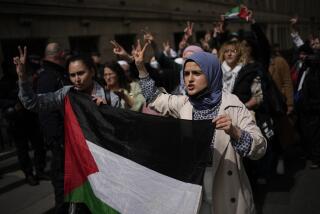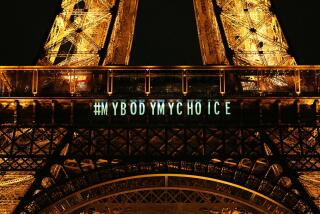Divided France Unites Over Hostages
- Share via
PARIS — Muslim women in head scarves, journalists in jeans and senators draped in tricolored sashes rallied here Monday in support of two French hostages held in Iraq by kidnappers demanding that France repeal a new ban on the Islamic head scarf in public schools.
The plight of the captive journalists brought together a multiethnic crowd that represented the new France -- about 3,000 protesters chanting: “Free the hostages! No blackmail!”
The gathering, in a plaza across the Seine River from the Eiffel Tower, was part of a larger display of unity that has temporarily muted a difficult debate here over the head scarf ban, which is to take effect when school starts Thursday.
“Paradoxically, it’s exactly the reverse of what the kidnappers would want,” said Olivier Roy, an expert on Islam at the National Center for Scientific Research here. “The reaction is likely to moderate things, to make the return to school calmer than it would have been.”
France has suddenly and unexpectedly joined the list of countries victimized by kidnappings in Iraq at an especially painful, complex moment for a country struggling to balance disparate ideas, values and demographics. Any lingering illusions that it might be spared because of its antiwar stance -- and French officials were already grimly realistic about the chances of the country being targeted by Islamic terrorists -- have crumbled.
The hostage ordeal highlights France’s struggle with the conflicts and contradictions of its identity: The law was launched as a response to a perceived threat from Muslim fundamentalism to French values in schools and other public institutions.
France’s longtime pro-Arab foreign policy helped push it to the forefront of opposition to the war in Iraq. But on the home front, it has maintained a centralized, resolutely secular state, imposing a monolithic French culture over individual ethnic and religious identities.
In addition, France’s role as a champion of liberty and tolerance has been tested by the difficult integration of Europe’s largest Muslim community, especially as militant Islam and far-right politics have risen rapidly in recent years.
Aggravating the tension and uncertainty, militants in Iraq released a video Monday night in which the two hostages appealed to the French government to annul the scarf ban in order to save their lives. Their captors extended an ultimatum to the government by 24 hours, until 9 tonight, Paris time.
The events in Iraq have pushed France’s conflict with itself onto the international stage.
French Cabinet ministers want to show toughness while looking for solutions that save the two lives in Iraq and keep the peace at home.
French Muslim leaders are seeking to repudiate terrorist tactics without ceding political ground. For the moment, even Muslim hard-liners have moderated their tone and found themselves in the unusual position of urging the government to defend the very head scarf ban they oppose.
A case in point is Fuad Allawi of the Union of Islamic Organizations, an outspoken critic of the law. Allawi’s group has backed away from earlier statements suggesting that Muslim girls should defy the ban when school starts this week.
On Monday, Allawi condemned the Iraqi militants as kidnappers and extortionists.
But he also stressed that the hostage-taking “should not lead to another blackmail” in which French Muslims feel compelled to refrain from denouncing “the abusive application” of the scarf law, he said.
As Islamic activists seek to make clear that they do not sympathize with the hostage-takers, French intelligence officials worry that the life-and-death stakes will harden attitudes on both sides. Conflicts could erupt at a time when educators and the Islamic community are quietly looking for compromises, such as allowing girls to wear bandannas, a high-ranking intelligence official said.
“Most non-Muslims aren’t going to want any kind of concession after what’s happened in Iraq,” the official said. “And the most radical Islamic elements could get incited by the internationalization of the issue, even though you’d think most of them would want to be discreet at the moment.”
From street-level spies at home to top envoys overseas, the French state poured its full energy into the crisis Monday. Foreign Minister Michel Barnier was in Cairo on the first stop of a Middle East swing. His deputy rushed to Baghdad leading a crisis-management team.
After meeting with Egyptian religious and government authorities, Barnier issued a statement calling for the release of the hostages, Christian Chesnot of Radio France International and Georges Malbrunot of Le Figaro, who went missing on the road from Baghdad to Najaf a week and a half ago. A group identifying itself as the Islamic Army in Iraq, which is suspected in the recent abduction and killing of an Italian journalist, claims to be holding the Frenchmen.
Barnier’s words in Cairo were intended to fulfill President Jacques Chirac’s vow Sunday to “explain France” to the Arab world and win help at a moment of truth. The foreign minister said France had embraced Islam at home and abroad, evoking foreign policy areas that -- though he did not mention the Bush administration -- have collided with the U.S. world view in recent years.
“France has always rejected the vision of a clash between the West and Islam,” Barnier said. “She defends -- in Iraq, in Palestine, in the near and Middle East and throughout the world -- the justice and dignity of people. France, along with other nations, is in the avant-garde of the defense of international law. Everywhere, she defends and will defend the sovereignty of people.”
The blitz to free the hostages puts to the test France’s long-nurtured web of alliances throughout the Arab world. Chirac, one of the West’s oldest leaders, counts a number of Arab heads of state as personal friends. His government’s strategy consists of recruiting Arab dignitaries and intelligence services and Sunni religious figures as private and public intermediaries with the Iraqi militants, Roy said.
“The government won’t negotiate anything having to do with the veil, but it will deploy every Sunni ulema [Muslim scholar] it can in the Middle East,” the Islam expert said. “The idea is to paint the hostage-takers as bad Muslims.”
Simultaneously, the Chirac government hopes the current spirit of solidarity persists at home. Though the head scarf dispute raises questions about religion coming before nationality, many French Muslims say that, right now, their loyalties lie with their two endangered countrymen -- the unshaven men whom television screens showed sitting in front of a gray mud wall Monday night.
“I’m a practicing Muslim, but I respect the laws in the land where I live,” said Fatima Louakaf, 50, interviewed in the newspaper Le Parisien on Monday. “The Muslim world must mobilize to liberate them. If not, the only consequence will be the increase of racism here at home.”
More to Read
Sign up for Essential California
The most important California stories and recommendations in your inbox every morning.
You may occasionally receive promotional content from the Los Angeles Times.










